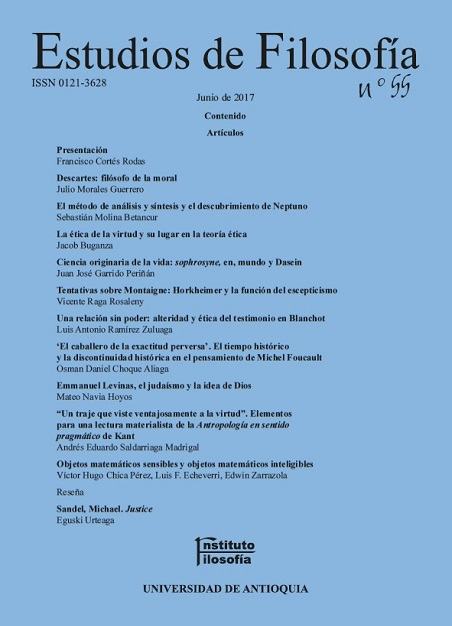Sensitive mathematical objects and intelligible mathematical objects
DOI:
https://doi.org/10.17533/udea.ef.n55a11Keywords:
Mathematical objects, Greek antiquity, arithmetic, logisticsAbstract
In this paper we study the concept of mathematical object as it was understood by ancient mathematical thought, particularly by Plato and Aristotle. We are going to prove that it is not right to interpret the duality of this concept in Plato’s works as consequence of an ontological division between two kinds of mathematical objects, i.e. the sensitive and the intelligible ones. We want to prove that such a division is not a real one because, as a matter of fact, Plato is proposing a differentiation between two possible ways to be related with mathematical objects: the way of the philosophers and the way of the non–philosophers. Moreover, we show that our interpretation is able to clarify the ambiguity around the concept of μоνάς and therefore eliminate the false distinction between the two subject matters devoted to the study of discrete mathematical objects: the λоγιστική and the ἀριθμητική.
Downloads
References
Anglin and Lambek (1995). The Heritage of Thales. New York: SpringerVerlag.
Aristóteles (1970). Metafísica. Traducción: Valentín García Yebra, Edición trilingüe, Madrid: Gredos.
Aristóteles (1995). Física. Traducción: Guillermo R. de Echandía, Madrid: Gredos.
Aristóteles (1989). Posterior Analitics. Cambridge: Harvard University Press Classical Loeb.
Aristóteles (1993). Ética Nicomaquea, traducción: Julio Palí Bonet, Madrid, Gredos.
Cherniss. H. (1951). Plato as Mathematician. En: Review of Methaphisics, (4): 395–425.
Euclides. (1969). The Thirteen Books of the Elements. Translation into English by Thomas L. Heath, (3 volumes), New York: Dover.
Euclides. (1991). Elementos, Traducción: María Luisa Puertas, Madrid, Gredos.
Enderton. H. B. (1977). Elements of Set Theory. New York: Academic Press.
Gadamer, H. G. (1995). El inicio de la filosofía occidental. España: Paidós.
Gosling, J. C. B. (1993). Platón. México: Universidad Nacional Autónoma De México
Guthrie, W. (1977). A History of Greek Philosophy. (Vol. 5). Inglaterra: University of Cambridge.
Halmos. P. R. (1973). Teoría Intuitiva de Conjuntos. Trad, Antonio Martín Lunas. México: CECSA.
Heath. T. L. (1965). A History of Greek Mathematics. London: Oxford University Press.
Heath. T. L. (1963). A Manual of Greek Mathematics. New York: Dover.
Klein. J. (1968). Greek Mathematical Thought and the Origin of Algebra. Translated from the German by Eva Brann. Cambridge: MIT.
McCabe, M. M. (1999). Plato’s Individuals. Princeton: Princeton University Press.
Meldelson. E. (1987). Introduction to Mathematical Logic. Monterrey (California): Wadsworth and Brooks.
Mosterín. J. (1980). Teoría Axiomática de Conjuntos. Madrid: Ariel.
Platón. (1992). Diálogos. Volúmenes I–VI, Madrid: Gredos.
Platón. (1994). Republic, Parmenides, Meno, Phaedo, Philebus. Cambridge: Harvard University Press.
Pritchard, P. (1995). Plato’s Philosophy of Mathematics. Sankt Agustin: Academia Verlag
Proclo. (1970). A Commentary on the First Book of Euclid’s Elements. Princeton: University Press.
Ross, D. (1986). La teoría de las ideas de Platón. España: Catedra.
Sayre, K. M. (1983). Plato’s late ontology –A riddle resolved–. New Jersey: Princeton University Press.
Wedberg. A. (1955). Plato’s Philosophy of Mathematics. Stockholm: Almquist and Wiksell.
White, N. P. (1999). Plato’s metaphysical epistemology. En: KRAUT, R. (ed.). The Cambridge Companion to Plato. Cambridge: Cambridge university press.
Downloads
Published
How to Cite
Issue
Section
Categories
License
Copyright (c) 2017 Víctor Hugo Chica Pérez, Luis F. Echeverri, Edwin Zarrazola

This work is licensed under a Creative Commons Attribution-NonCommercial-ShareAlike 4.0 International License.
Authors who publish with this journal agree to the following terms:
1. The Author retains copyright in the Work, where the term "Work" shall include all digital objects that may result in subsequent electronic publication or distribution.
2. Upon acceptance of the Work, the author shall grant to the Publisher the right of first publication of the Work.
3. The Author shall grant to the Publisher a nonexclusive perpetual right and license to publish, archive, and make accessible the Work in whole or in part in all forms of media now or hereafter known under a Creative Commons Attribution-NoCommercia-ShareAlike (CC BY-NC-SA 4.0), or its equivalent, which, for the avoidance of doubt, allows others to copy, distribute, and transmit the Work under the following conditions: (a) Attribution: Other users must attribute the Work in the manner specified by the author as indicated on the journal Web site;(b) Noncommercial: Other users (including Publisher) may not use this Work for commercial purposes;
4. The Author is able to enter into separate, additional contractual arrangements for the nonexclusive distribution of the journal's published version of the Work (e.g., post it to an institutional repository or publish it in a book), as long as there is provided in the document an acknowledgement of its initial publication in this journal;
5. Authors are permitted, and Estudios de Filosofía promotes, to post online the preprint manuscript of the Work in institutional repositories or on their Websites prior to and during the submission process, as it can lead to productive exchanges, as well as earlier and greater citation of published work (see The Effect of Open Access). Any such posting made before acceptance and publication of the Work is expected be updated upon publication to include a reference to the Estudios de Filosofía's assigned URL to the Article and its final published version in Estudios de Filosofía.















